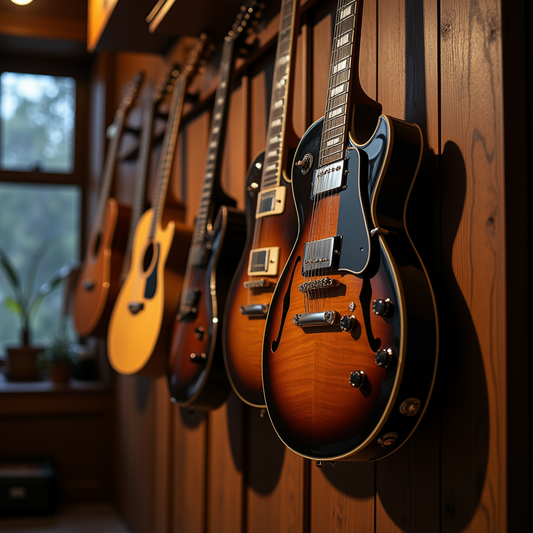Acoustic, Electric, or Bass? Which Guitar is Right for You?
Share
Introduction
When starting your guitar journey, one of the first decisions you’ll need to make is what type of guitar to buy. Should you go for the classic acoustic guitar, a sleek electric guitar, or the powerful bass guitar? Each type has its own unique sound, feel, and uses in various genres of music. In this blog, we’ll break down the differences between acoustic, electric, and bass guitars, helping you choose the best fit for your musical aspirations.
1. Acoustic Guitar: The Traditional Choice
What is an Acoustic Guitar? An acoustic guitar is a type of guitar that produces sound acoustically (without the need for an amplifier). It has a hollow body, which amplifies the sound of the strings when plucked or strummed.
Pros of Acoustic Guitars:
-
No Need for an Amp: Acoustic guitars are self-sufficient and do not require an amplifier to produce sound, making them great for practice sessions at home or on the go.
-
Versatility: They work well for a wide range of music genres, including folk, rock, pop, blues, and country.
-
Learning Simplicity: Acoustic guitars tend to be simpler for beginners to learn on, as the sound they produce doesn’t require electronic adjustments.
Cons of Acoustic Guitars:
-
Limited Sound Modification: Unlike electric guitars, you cannot alter the sound much beyond using finger techniques.
-
Size and Weight: Acoustic guitars can be bulkier and harder to transport compared to electric guitars, though some smaller models are available.
Best For: Beginners who want to learn basic guitar skills and enjoy unplugged performances. If you’re interested in fingerstyle or folk music, an acoustic guitar is a great choice.
2. Electric Guitar: The Sound of Rock and More
What is an Electric Guitar? An electric guitar is designed to be plugged into an amplifier. It has a solid body (no resonating chamber) and uses electromagnetic pickups to convert the vibration of the strings into electrical signals, which are then amplified.
Pros of Electric Guitars:
-
Wide Range of Sounds: Electric guitars can be modified easily to create a variety of sounds, from clean tones to distorted, crunchy rock sounds. With pedals and amps, you can explore endless possibilities.
-
Easier on the Fingers: Electric guitars generally have lighter strings, making them easier to press down, which is great for beginners.
-
Ideal for Modern Music: Electric guitars are the go-to choice for rock, metal, punk, jazz, and blues. If you’re into contemporary genres, an electric guitar will give you the sound you need.
Cons of Electric Guitars:
-
Requires Additional Equipment: To get the best sound, you’ll need an amplifier and possibly other equipment like pedals, which can add to the cost.
-
More Expensive: On average, electric guitars can be more expensive than acoustics, especially when you factor in the cost of an amp and accessories.
Best For: Aspiring rock stars, metalheads, and anyone who wants to experiment with different sounds and tones. If you’re into modern music genres and enjoy tweaking your sound, an electric guitar is the way to go.
3. Bass Guitar: The Backbone of the Band
What is a Bass Guitar? A bass guitar is similar to an electric guitar but with a lower range of notes. It typically has four strings (though five- or six-string models are available), and the strings are thicker and tuned to lower frequencies.
Pros of Bass Guitars:
-
Essential in Many Genres: The bass guitar plays a crucial role in most music genres, particularly in rock, jazz, funk, and pop. It provides the rhythm and foundation of the music.
-
Unique Role: The bass player typically holds down the rhythm section, playing in sync with the drums, while the lead guitar handles melody.
-
Larger Fretboard: The bass has a longer neck and wider fretboard, which can be easier for players who prefer fewer strings and less string tension.
Cons of Bass Guitars:
-
Less Melodic: Unlike acoustic and electric guitars, the bass is more focused on rhythm and less on melody, which can limit the type of songs you can play.
-
Requires an Amp: Like electric guitars, bass guitars need an amplifier to be heard clearly.
Best For: People interested in joining a band or focusing on the rhythm section. If you enjoy deep, punchy sounds and want to be the foundation of a musical group, the bass guitar is an excellent choice.
4. Comparing Acoustic, Electric, and Bass Guitars
| Feature | Acoustic Guitar | Electric Guitar | Bass Guitar |
| Sound | Natural, no amp required | Versatile, requires an amp | Deep, low-frequency sound |
| Playing Style | Great for strumming, fingerstyle | Ideal for solos, rhythm, and effects | Focused on rhythm, low-end foundation |
| Strings | 6 strings (sometimes 12) | 6 strings (more options for higher tuning) | 4-6 strings, tuned lower |
| Size/Portability | Generally bulkier and heavier | Lighter and more portable | Larger body, but still portable |
| Ideal For | Folk, country, acoustic rock | Rock, metal, blues, jazz, pop | Bands, jazz, rock, funk, and pop |
| Learning Curve | Easier for beginners, but can be hard on fingers | Easier to press down on strings | Easier than an electric guitar but requires precision |
5. Which Guitar Should You Choose?
Your choice depends on the kind of music you want to play and your personal preferences:
-
If you want to play unplugged and focus on learning the basics: Go for an acoustic guitar. It’s great for solo practice and offers a natural, rich sound.
-
If you’re interested in modern genres like rock, metal, or pop: Opt for an electric guitar. It gives you a lot of flexibility and allows you to experiment with different sounds.
-
If you love rhythm and want to create the backbone of the band: Consider a bass guitar. It’s perfect for playing in groups and making the music feel fuller.
6. Final Thoughts: Start Your Musical Journey Today
Whether you choose an acoustic, electric, or bass guitar, remember that the most important thing is to start playing and enjoy the process. Each guitar type offers its unique set of challenges and rewards, so pick the one that excites you the most.



